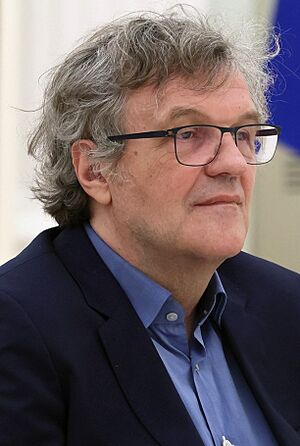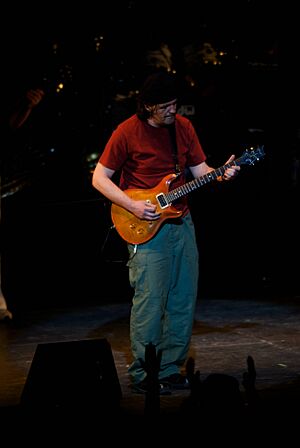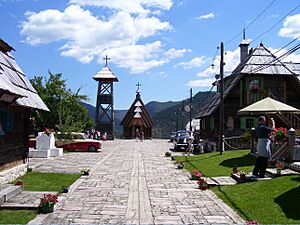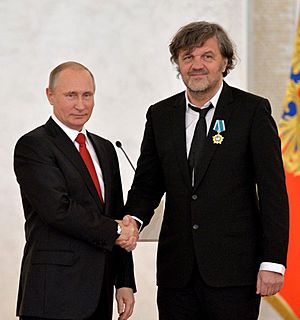Emir Kusturica facts for kids
Emir Kusturica (Serbian Cyrillic: Емир Кустурица, pronounced [ě.mir ˈku.stu.ri.tsa]; born 24 November 1954) is a famous Serbian film director, screenwriter, actor, film producer and musician. He has been making films since the 1980s.
Kusturica has won many important awards for his movies. He won the Palme d'Or twice at the Cannes Film Festival for When Father Was Away on Business and Underground. He also won the Best Director prize at Cannes for Time of the Gypsies. He received a Silver Bear at the Berlin Film Festival for Arizona Dream. At the Venice Film Festival, he won a Silver Lion for Black Cat, White Cat and another Silver Lion for his first film, Do You Remember Dolly Bell?.
France has honored him as a Commander of the French Ordre des Arts et des Lettres. Kusturica also became a UNICEF ambassador in 2002. Eight years later, he was made a chevalier of the Legion of Honour in France. He is also a member of the Academy of Sciences and Arts of the Republika Srpska.
Kusturica is also known for building towns. Since the mid-2000s, he has lived mainly in Drvengrad. This town was built for his film Life Is a Miracle in the Mokra Gora region of Serbia. He helped rebuild parts of the old village for the movie. In 2010, he wrote his autobiography called "Smrt je neprovjerena glasina" (which means 'Death Is an Unverified Rumour'). He has written four more books since then.
Early Life
Emir Kusturica was born in Sarajevo. His father, Murat Kusturica, was a journalist. His mother, Senka (née Numankadić), worked as a court secretary. Emir grew up as the only child in a family that was not very religious. They lived in Sarajevo, which was then the capital of PR Bosnia and Herzegovina in FPR Yugoslavia.
Kusturica has said that his father's mother was very religious. However, his father was not religious at all. Kusturica mostly saw himself as Yugoslavian until the year 2000.
As a young person, Kusturica admitted he was a bit of a troublemaker. He grew up in the Gorica area of Sarajevo. When he was seventeen, he got a small part in a film. This happened because his father was friends with the director Hajrudin "Šiba" Krvavac. The film was Walter Defends Sarajevo, a 1972 movie about partisans.
Film Career
In 1978, Kusturica finished film school (FAMU) at the Academy of Performing Arts in Prague. Because of this, he is sometimes seen as part of the Prague film school. This was a group of Yugoslav directors who studied at FAMU. They shared similar ideas and styles in their films. After graduating, Kusturica started directing short films for TV in Yugoslavia.
Early Films (1980s)
His first full-length movie was Do You Remember Dolly Bell? in 1981. This was a drama about growing up. It won the important Silver Lion award for Best First Work at the Venice Film Festival that year. In the same year, at age 27, he started teaching at the new Academy of Performing Arts in Sarajevo. He taught there until 1988. He also worked as the art director for Open Stage Obala.
Kusturica's second movie, When Father Was Away on Business (1985), won the Palme d'Or at the Cannes Film Festival. It also won five Yugoslav movie awards. The film was nominated for an American Academy Award for Best Foreign Film. In 1989, he received more awards for Time of the Gypsies. This film was about Romani culture and how young people were exploited. In 1989, he was a judge at the 16th Moscow International Film Festival.
Acclaimed Works (1990s)
Kusturica continued to make highly praised films in the 1990s. This included his first American film, the funny and unusual comedy Arizona Dream (1993).
He won the Palme d'Or again for his dark comedy Underground (1995). This film was based on a story by Dušan Kovačević, a famous Serbian writer. Underground told the story of Yugoslavia from World War II through the conflicts in the 1990s. Some critics from Bosnia and France said the film showed a pro-Serb view. However, it was later found that some critics had not seen the film before writing about it.
In 1998, he won the Venice Film Festival's Silver Lion for Best Direction for Black Cat, White Cat. This was a funny comedy set in a Gypsy (Romani) village by the Danube river. The music for this film was made by the band No Smoking Orchestra.
Later Films (2000s)
In 2001, Kusturica directed Super 8 Stories. This was a documentary about The No Smoking Orchestra, where he is a band member. He was chosen to be the main judge for the 2005 Cannes Film Festival. His film Maradona by Kusturica, a documentary about the Argentine football star Diego Maradona, was released in Italy in May 2007. It was shown in France at the Cannes Film Festival in 2008. His film Promise Me This was first shown at the 2007 Cannes Film Festival. In June 2007, Kusturica directed the music video for Manu Chao's song "Rainin in Paradize".
In 2002, Kusturica became a UNICEF National Ambassador for Serbia.
Since January 2008, he has organized the yearly Küstendorf Film Festival. The first festival was held in Drvengrad/Küstendorf. This village was built for his film Life Is a Miracle. His next film, Cool Water, is a comedy set during a Middle East conflict. Filming began in November 2010 in Germany.
Recent Projects (2010s and 2020s)
In October 2010, Kusturica left the jury of the Antalya Golden Orange Film Festival. This happened after he was criticized by some Turkish officials and groups. Kusturica later said he received an apology from the mayor of Antalya. He also stated that he condemned crimes committed by all sides in the Bosnian conflict.
At the 64th Cannes Film Festival in May 2011, Kusturica led the jury for the Un Certain Regard section. On May 14, he received the Legion of Honour, which is France's highest award.
In September 2012, Kusturica agreed to be the head judge for the first Saint Petersburg International Film Festival. He also performed with his band, The No Smoking Orchestra, at the festival.
Kusturica received the Order of St. Sava, First Class, on May 12, 2012. This was for his efforts in showing the Serbian nation to the world.
In late 2013, Kusturica started making a documentary about the life of Uruguayan president José Mujica. He called Mujica "the last hero of politics." This film, El Pepe: A Supreme Life, was released in 2018.
Kusturica has announced that his next film project will be in Moscow. The film will be based on stories by Russian writers like Dostoyevski, Gogol, and Tolstoy. It is called Just One More Time.
Acting Roles
Kusturica has had many small roles in films over the years. His first big acting part was in The Widow of St. Pierre (2000). In this movie by director Patrice Leconte, he played a prisoner on the French island colony of Saint Pierre.
In 2002, Kusturica appeared as an electric guitar player and security expert in The Good Thief. This film was directed by Neil Jordan.
He played a KGB agent named Colonel Sergei Gregoriev in the French movie L'affaire Farewell (2009).
In On the Milky Road (2016), he played Kosta, a milkman and falconer.
Musical Career
In the mid-1980s, Kusturica started playing bass guitar in Zabranjeno Pušenje. This was a punk/garage rock band from Sarajevo. Kusturica was already a well-known film director when he joined the band. He played bass on three songs from their third album, Pozdrav iz zemlje Safari. He also wrote one of the songs and directed a music video for the song "Manijak." Kusturica left the band in 1988 when he started filming Time of the Gypsies.
Kusturica rejoined the group in the late 1990s after his film Black Cat, White Cat. The band's name then changed to Emir Kusturica & The No Smoking Orchestra. In 1999, they recorded a new album called Unza Unza Time. Kusturica directed a music video for it. The band has been touring around the world since 1999. The musician Goran Bregović composed music for three of Kusturica's films: Time of the Gypsies, Arizona Dream, and Underground.
Writing
Death is an Unverified Rumour
Kusturica's autobiography, Death is an Unverified Rumour (Смрт је непровјерена гласина / Smrt je neprovjerena glasina), was published in October 2010. It was released in Belgrade by Novosti. The book quickly sold out its first printing of 20,000 copies. It became very popular, selling over 100,000 copies in total.
The book has been translated into several languages. It was published in Italy in 2011 as Dove sono in questa storia ("Where am I in this Story"). In France, it was released as Où suis-je dans cette histoire ?. It also came out in Germany, Bulgaria, Greece, Romania, and Hungary.
Hundred Pains
Kusturica's second book was a novel called Hundred Pains (Сто јада / Sto jada). It was released in Serbia on April 24, 2013, by Novosti a.d. The book was also translated into French in January 2015 as Étranger dans le mariage.
Why Did I Need This
His third book was a diary titled Why Did I Need This (Шта ми ово треба / Šta mi ovo treba). It was published in October 2018 and first shown at the Belgrade Book Fair.
Vidiš li da ne vidim
In 2022, Kusturica published a book called Vidiš li da ne vidim. The main characters in this book are Kusturica himself and his friend, the Austrian Nobel Prize-winning writer Peter Handke.
Kada mrtve duše marširaju
His fifth book, Kada mrtve duše marširaju (When the dead souls march), was published in 2023.
Other Projects
Drvengrad
Drvengrad means 'Wooden Town'. It is a traditional village that Kusturica built for his film Life Is a Miracle. It is located in the Zlatibor District in Serbia. This town is near Mokra Gora and Višegrad. Višegrad is known for Yugoslav writer Ivo Andrić's novel, The Bridge on the Drina.
Time of the Gypsies Punk Opera
In 2007, Kusturica and Nele Karajlić created a punk opera called Time of the Gypsies. The idea for this opera came from Kusturica's friend Marc di Domenico in 2002. The director of the Paris Opera, Gerard Mortier, helped get the project started. Kusturica wrote the story for the opera. It was based on his 1988 film about a young Gypsy from the Balkans who goes to Italy to earn money for his sick sister's surgery.
Young Serbian folk singers Stevan Anđelković and Milica Todorović played the main roles. Karajlić played the role of Ahmed Đida. The music for the original movie was by Goran Bregović. However, since Kusturica and Bregović were not working together, new music was composed by Dejan Sparavalo of the No Smoking Orchestra.
The opera first opened in June 2007 at the Opéra Bastille in Paris. It received good reviews. The show was later performed in other places, including Belgrade and Banja Luka. On June 29, 2012, it was performed outdoors at the City Stadium for 10,000 people.
Küstendorf Film and Music Festival
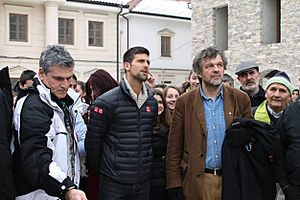
Since 2008, Drvengrad has hosted the yearly Küstendorf Film and Music Festival. This festival shows films and music from all over the world. It also has a competition for student short films. The festival is known for not having a red carpet or typical Hollywood festival features.
Many famous guests from European and world cinema attend the festival. This is because of Kusturica's reputation and connections. Stars like Johnny Depp, Monica Bellucci, Nikita Mikhalkov, and Audrey Tautou have been guests.
Andrićgrad
On June 28, 2011, Kusturica began building Andrićgrad. This town is also known as Kamengrad, meaning Stone Town. It is located in Višegrad, Republika Srpska, Bosnia and Herzegovina. Andrićgrad is a few kilometers from Kusturica's first town, Drvengrad, in Serbia. Andrićgrad will be used as a filming location for his new film "Na Drini ćuprija". This film is based on the book The Bridge on the Drina by Nobel Prize winner Ivo Andrić. The town is named after him, meaning "Town of Andrić" in Serbian.
Personal Life
Emir Kusturica also has French citizenship.
He is married to Maja Mandić, and they have two children. They live in Drvengrad.
Film director Živojin Pavlović and writer Fyodor Dostoyevski are his main artistic inspirations.
Identity and Beliefs
On Đurđevdan (St. George's Day) in 2005, Kusturica was baptized into the Serbian Orthodox Church. His new name became Nemanja Kusturica (Немања Кустурица). This happened at the Savina monastery near Herceg Novi, Montenegro. He explained that his father was an atheist and always said he was a Serb. Kusturica believes that even if his family was Muslim for some time, they were Orthodox before that. He feels that deep down, they were always Serbs.
Kusturica has explored his family history. He learned that his family came from two Orthodox Christian branches. An ancestor helped build the Arslanagić Bridge in the 18th century.
Views and Public Positions
Serbian Issues
Kusturica supported Ante Marković's efforts to reform Yugoslavia. He also gave support to Prime Minister Vojislav Koštunica in the 2007 parliamentary elections. In 2007, he supported the Serbian campaign "Solidarity - Kosovo is Serbia." This campaign was against the separation of Kosovo.
Kusturica is a strong supporter of protecting the environment. He is against lithium mining in Serbia. Because of this and his support for student protests against corruption, he has faced criticism from some media in Serbia.
Roman Polanski
In 2009, Kusturica signed a petition to support director Roman Polanski. Polanski had been arrested while traveling to a film festival. The petition argued that arresting filmmakers at festivals could harm the tradition of showing films "freely and safely."
Vladimir Putin and Russia
Kusturica has spoken about President of Russia, Vladimir Putin. In 2012, he said that if he were Russian, he would vote for Putin. Kusturica was present at the Kremlin for Putin's third inauguration as president in May 2012. He has also supported the 2014 Russian annexation of Crimea.
On November 4, 2016, he received the Order of Friendship from Vladimir Putin in Moscow. He spoke in Russian at the event.
In April 2022, Kusturica signed a petition. This petition asked Serbia not to place sanctions on Russia after it entered Ukraine. The petition suggested that a strong connection between Russian and Serbian people helps keep Serbia's territory safe.
He attended the 2025 Moscow Victory Day Parade on May 9, 2025. There, he expressed his support for Putin, calling him an "antiglobalist." Kusturica had also attended the parade in 2020.
Filmography
Feature Films
| Year | Film | Director | Writer | Producer | Awards / notes |
|---|---|---|---|---|---|
| 1981 | Do You Remember Dolly Bell? | Yes | Yes | No | Four prizes at Venice Film Festival |
| 1985 | When Father Was Away on Business | Yes | No | No | Palme d'Or |
| 1988 | Time of the Gypsies | Yes | Yes | No | Best Director Award, Guldbagge Award for Best Foreign Film |
| 1993 | Arizona Dream | Yes | Yes | No | Silver Berlin Bear |
| 1995 | Underground | Yes | Yes | No | Palme d'Or |
| 1998 | Black Cat, White Cat | Yes | No | No | Silver Lion, Little Golden Lion at Venice Film Festival |
| 2001 | Super 8 Stories | Yes | Yes | Yes | Silver Plaque at CIFF |
| 2004 | Life Is a Miracle | Yes | Yes | Yes | César Award |
| 2007 | Promise Me This | Yes | Yes | Yes | Palme d'Or nominee |
| 2008 | Maradona by Kusturica | Yes | Yes | No | |
| 2014 | Words with Gods | Yes | Yes | No | Co-author, anthology film |
| 2016 | On the Milky Road | Yes | Yes | No | Little Golden Lion Award at Venice Film Festival |
| 2018 | El Pepe: A Supreme Life | Yes | Yes | No | CICT-UNESCO Enrico Fulchignoni Award at Venice Film Festival |
Shorts and Television Work
| Year | Title | Director | Writer | Producer | Notes |
|---|---|---|---|---|---|
| 1978 | Guernica | Yes | No | No | Short film |
| 1978 | The Brides Are Coming | Yes | No | No | Television film |
| 1979 | Buffet Titanic | Yes | Yes | No | Television film |
| 1984 | Nije čovjek ko ne umre | Yes | No | No | Television film |
| 1996 | Bila jednom jedna zemlja | Yes | Yes | No | Television mini-series |
| 1997 | Magic Bus | Yes | No | No | Short film |
| 2018 | On the Milky Road | Yes | Yes | No | Television series |
| 2020 | Junaci našeg vremena | Yes | Yes | Yes | Short film |
As Actor (Selected Films)
| Year | Title | Role | Notes |
|---|---|---|---|
| 1972 | Walter Defends Sarajevo | Omladinac | |
| 1993 | Arizona Dream | Man in Bar | Uncredited |
| 1995 | Underground | Arms dealer | |
| 2000 | The Widow of Saint-Pierre | Ariel Neel Auguste | |
| 2002 | The Good Thief | Vladimir | |
| 2004 | Strawberries in the Supermarket | General | |
| 2006 | Secret Journey | Harold | |
| 2007 | Hermano | Chomsky | |
| 2009 | L'affaire Farewell | Grigoriev | |
| 2011 | Nicostratos the Pelican | Démosthène | |
| 2012 | 7 Days in Havana | Segment "Jam Session" | |
| 2013 | Au bonheur des ogres | Stojil | |
| 2014 | Words with Gods | Monk | |
| 2016 | On the Milky Road | Kosta | |
| 2019 | The Balkan Line | Taksista | |
| 2022 | Srpska: The Struggle for Freedom | Self |
Awards and Honors
Selected Film Awards
- 1st prize on Student's Film Festival in Karlovy Vary, (1978) for Guernica
- Silver Lion for "Best First Work" in Venice Film Festival, (1981) for Do You Remember Dolly Bell?
- FIPRESCI prize at Venice Film Festival (1981) for Do You Remember Dolly Bell?
- Golden Palm Cannes Film Festival, (1985) for When Father Was Away on Business
- FIPRESCI prize Cannes Film Festival, (1985) for When Father Was Away on Business
- Best Foreign Language Academy Award Nomination, (1985) for When Father Was Away on Business
- Best Director award at Cannes Film Festival, (1989) for Time of Gypsies
- Silver Bear – Special Jury Prize at the Berlin Film Festival, (1993) for Arizona Dream
- Golden Palm at Cannes Film Festival, (1995) for Underground
- Silver Lion for best director in 1998 Venice Film Festival for the film Black Cat, White Cat.
- Silver Plate of best documentary at Chicago International Film Festival, (2001) for Super 8 Stories
- Cinema Prize of the French Education System at Cannes Festival (2004) for Life is a Miracle
- Best European Union Film at César Awards, (2005) for Life is a Miracle
- In 2004, The Prix de l'Education nationale (National Education Prize) honored Emir Kusturica and his film Život je čudo (Life is a Miracle).
- Lifetime Achievement Award at the 26th Moscow International Film Festival
- Honorary Magritte Award at the 4th Magritte Awards, on 1 February 2014.
- CICT-UNESCO Enrico Fulchignoni Award, Venice film festival, 2018.
Architecture Awards
- Philippe Rotthier European Architecture Award for his village project Küstendorf (also called Drvengrad – "wooden town") on Mt. Zlatibor, Serbia, in 2005.
Literature Awards
- On April 8, 2011, Kusturica was the first person to receive the "Momo Kapor award" for his book Death is an Unverified Rumour.
- In 2011, Kusturica won the "Tipar award" for satire.
- 'Dejan Medaković' Award, 2022
- 'Radovan Beli Marković' Award, 2023
- 'Borisav Stanković' Award, 2024
Orders and Decorations
- Ordre des Arts et des Lettres, France's highest order for contributions to the arts.
- Order of St. Sava, Serbian Orthodox Church's highest decoration, on May 12, 2012.
- Order of St. King Milutin, awarded in Andrićgrad by Serbian Orthodox Church, on June 28, 2014.
- Order of the Holy Despot Stefan Lazarevic, 2016
- Order of Friendship, 2016
- Order of the Star of Italy, 2017
- Golden medal Sergei Bondarchuk, 2017
- Order of the Flag of Republika Srpska, 2018.
- Medal of Merit of the Czech Republic, October 28, 2019.
- Sretenje Order, 2021
- Medal ‘Great Russian writer F.M. Dostoevsky 1821-2021’ awarded by the Ministry of Culture of the Russian Federation, 2023
- Order of St. Most Reverend Seraphim of Sarov, Russian Orthodox Church, 2024
See also
 In Spanish: Emir Kusturica para niños
In Spanish: Emir Kusturica para niños
- List of UNICEF Goodwill Ambassadors


